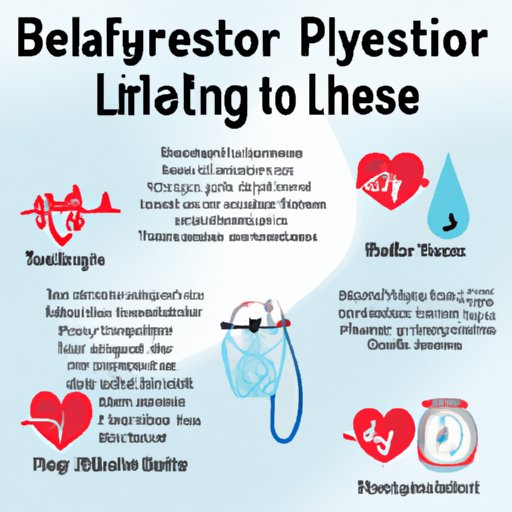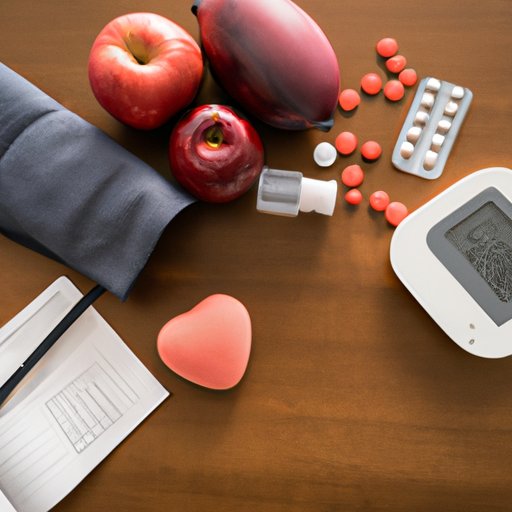Lower Your Blood Pressure: Tips and Strategies for a Healthier Heart
High blood pressure, or hypertension, is a common health concern that affects millions of people around the world. When left untreated, it can increase the risk of heart disease, stroke, and other serious health problems. However, by taking steps to lower blood pressure, people can improve their overall health and reduce their risk of complications. In this article, we’ll explore some of the most effective strategies for lowering blood pressure and maintaining a healthier heart.

Section 1: Lifestyle Changes for Lowering Blood Pressure
One of the most effective ways to lower blood pressure is to make changes to your lifestyle. Here are some tips:
Exercise Regularly
Regular exercise is an important part of a healthy lifestyle, and it can help reduce blood pressure. Aim for at least 30 minutes of moderate-intensity exercise most days of the week. This can include activities like walking, cycling, swimming, or dancing. If you’re new to exercise, start slowly and build up gradually over time.
Cut Back on Salt
One of the biggest contributors to high blood pressure is a diet that’s high in salt. Try to limit your salt intake by avoiding processed foods, reading nutrition labels, and cooking more meals from scratch.
Reduce Stress
Stress can have a negative impact on blood pressure, so it’s important to find ways to manage it. Try practices like meditation, yoga, or deep breathing exercises. You can also find stress relief in hobbies like reading, gardening, or spending time with loved ones.
Section 2: The DASH Diet for Lowering Blood Pressure
The DASH diet is a dietary approach that’s been shown to help lower blood pressure. It emphasizes fruits, vegetables, whole grains, lean proteins, and low-fat dairy products. Here are some tips:
Foods to Include
Include plenty of fruits, vegetables, and whole grains in your diet. Choose lean proteins like chicken, fish, and beans. Incorporate low-fat dairy products like milk and yogurt.
Foods to Avoid
Avoid foods that are high in saturated fat, such as red meat, butter, and cheese. Limit your intake of sweets and sugary drinks.
Sample Meals and Recipes
For breakfast, try a bowl of oatmeal with fresh fruit and low-fat milk. For lunch, pack a salad with spinach, grilled chicken, and a vinaigrette dressing. For dinner, grill some salmon and serve it with roasted vegetables and brown rice.
Section 3: Supplements for Lowering Blood Pressure
In addition to lifestyle changes and diet, there are also some supplements that can help lower blood pressure. Here are a few:
Magnesium
Magnesium is a mineral that plays a role in regulating blood pressure. It can be found in foods like spinach, almonds, and black beans. If you’re not getting enough through your diet, consider taking a magnesium supplement.
Potassium
Potassium is another mineral that can help regulate blood pressure. It can be found in foods like bananas, sweet potatoes, and lentils. If you’re not getting enough through your diet, consider taking a potassium supplement.
CoQ10
Coenzyme Q10 (CoQ10) is an antioxidant that can help improve heart health. It’s naturally produced by the body, but levels can decrease with age. Consider taking a CoQ10 supplement to support heart health.
Section 4: Mindfulness Practices for Lowering Blood Pressure
Mindfulness practices like meditation and yoga can be effective tools for reducing stress and lowering blood pressure. Here are some tips:
Meditation
Sit in a quiet, comfortable place and focus on your breath. If your mind starts to wander, gently bring it back to your breath. Start with just a few minutes and gradually increase the amount of time you meditate each day.
Yoga
Yoga combines physical postures with deep breathing and meditation. Look for beginner yoga classes in your area or try following a yoga video online.
Section 5: Medication for Lowering Blood Pressure
If lifestyle changes, diet, and supplements aren’t enough to lower your blood pressure, your doctor may recommend medication. Here are a few common medications:
Diuretics
Diuretics are medications that can help reduce excess fluid in the body, which can help lower blood pressure. They’re often the first medication prescribed for high blood pressure.
Beta-Blockers
Beta-blockers work by blocking the effects of adrenaline on the heart. This can help reduce blood pressure and slow a rapid heartbeat.
Calcium Channel Blockers
Calcium channel blockers work by relaxing the muscles of the blood vessels, which can help lower blood pressure. They can also help relieve chest pain and reduce the risk of heart attack.
Conclusion
Lowering your blood pressure is an important part of maintaining a healthy heart. Lifestyle changes like exercise, reducing salt intake, and managing stress are all effective strategies for lowering blood pressure. The DASH diet can also be a helpful tool. Supplements like magnesium, potassium, and CoQ10 can provide additional support. Mindfulness practices like meditation and yoga can help reduce stress. If lifestyle changes aren’t enough, medication may be prescribed. Talk to your doctor about your blood pressure and develop a plan that works for you.
